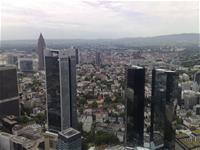After gaining the command of the EU, Germany looked at the US
Adelina Marini, February 10, 2011
 Maybe the most significant news I have ever heard recently - Deutsche Börse is negotiating on the acquisition of the New York Stock Exchange (NYSE). According to leading international financial media, it was the German stock exchange that announced the news about the negotiations, which were in a very advanced stage and is expected the German exchange to acquire 59-60% of the shares of the future new company to be based in the Netherlands. The new group will have headquarters in New York and in Frankfurt.
Maybe the most significant news I have ever heard recently - Deutsche Börse is negotiating on the acquisition of the New York Stock Exchange (NYSE). According to leading international financial media, it was the German stock exchange that announced the news about the negotiations, which were in a very advanced stage and is expected the German exchange to acquire 59-60% of the shares of the future new company to be based in the Netherlands. The new group will have headquarters in New York and in Frankfurt.
According to the Financial Times, the negotiations on the merge have started in October when the merger of the Singapore's and Australia's exchanges was announced. The newspaper recalls that this is not the first time when a deal is being debated between the two giants. The first attempt failed in 2008. However now, the deal has a "good support" from the highest political level in Germany, the newspaper writes, quoting sources of its own.
The New York Times points out though, that if realised, the deal would create the largest financial market in the world with the presence of 14 European countries and the United States. The New York Stock Exchange is the symbol of Wall Street but also the symbol of the global financial and economic crisis, the impact of which are still a great challenge for the global economy. The newspaper recalls that the exchange was established in 1792 when dealers gathered under a tree in lower Manhattan to trade five securities of the new state.
The American newspaper points out that, except political resistance, the future deal might cause a regulatory one too. The leaders in the City of the Apple have always insisted its status of a financial capital to be kept. The tremors at the global financial markets are being felt for a long time, which forced the British premier recently to emphasize that he insisted London to remain a global financial centre, obviously having in mind the broadening influence of Frankfurt.
The New York Times also comments that competition among exchanges has been increasing intensively in the last few years as investors, who seek speed, lower prices and greater liquidity, gathered before the electronic platforms, where the financial centres and traditions don't really matter. Besides, the newspaper writes further, the stock exchanges are under pressure to make more cuts and invest in technologies that would allow them undertake more and more transactions.
The admission of the two exchanges about the merge negotiations is happening at a time when Germany, together with France, has again headed the European Union by proposing the creation of a Pact for Competitiveness which practically is a separation of the euro area countries into a Super League with the ambition of more coordination in sensitive areas like pensions, wage levels and other factors which win or loose elections. So far support for the Pact have expressed the highly competitive European economies. Those who have shortages of competitiveness are either silent on the matter or protest (like Italy).
or loose elections. So far support for the Pact have expressed the highly competitive European economies. Those who have shortages of competitiveness are either silent on the matter or protest (like Italy).
Still, both Deutsche Börse and NYSE announced that, although the negotiations were in a very advanced stage, it was not impossible for them to fail again.
The reactions in Europe, however, are negative or cautious. According to the liberal German newspaper Handelsblatt, quoted by the European press review website eurotopics, if the German and New York exchanges merge, the new exchange would not limit itself only to its internal markets but would be active where there were still markets to acquire, like in Asia or South America. This would make, according to the newspaper, the exchange operators in London or elsewhere look like regional exchanges. Handelsblatt comments that the biggest losers from the merger will be the employers of the two exchanges and the clients of the new one.
Similar considerations could be seen in many other European newspapers last week, according to which the big was not necessary the better. The Belgian financial daily De Tijd warned that given the 2008 crisis it was important something that big to be able to survive under any conditions. "It should be noted that the rather lacklustre Deutsche Börse in Frankfurt has managed to swallow up Wall Street, the mother of all stock changes. This brings to mind that old saying that football is a game with 22 players which the Germans always win in the end. The stock market version could be that the wave of fusions in the stock exchange world may be constantly reducing the number of players, but at the end of the day the Deutsche Börse has the biggest pockets"*, the Belgian newspaper wrote.
*In fact this is not a proverb but a remark of the famous English footballer Gary Lineker